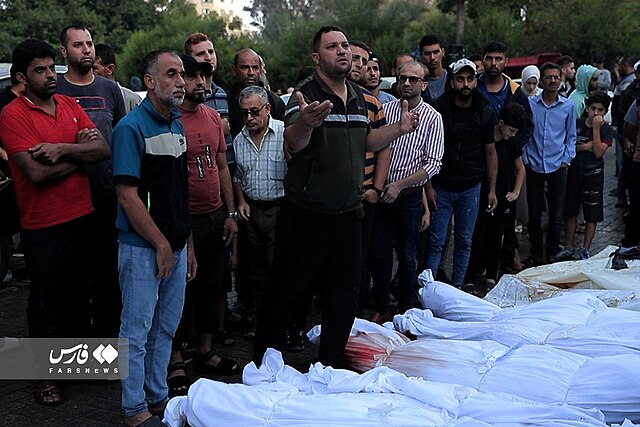Revive Peace Talks: Eliminating Social Movements like Hamas is a Delusion

By: Ghassan Michel Rubeiz / Arab America Contributing Writer
I am shocked and perturbed by Hamas. I do not accept its approach or conduct in war. Hamas’s October 7 attack on several communities in south Israel violated the rules of war; the attack was a war crime. There is no moral justification for acts of murdering and abducting civilians to achieve political gains. The Palestine cause has not been advanced by the events of October 7th. Relations between Arabs and Jews are worse today than they have been for decades. Human relations are the foundations of peacebuilding.
That said, the best way to deal with Hamas is to tackle the political conditions that led to its formation and access to power. Over the past two weeks, Israel’s response to this sudden, frightening, and humiliating attack has been misguided; the disproportionate and indiscriminate military reaction has made things worse for the people of Palestine, and for the long run, for Israel.
So far, about four thousand Palestinians have been killed, many more injured and a million displaced. The entire Gaza Strip is nearly destroyed and the population is on the brink of collapse from thirst, hunger, and lack of medicine and medical care. There are fifty thousand pregnant women in this targeted community; five thousand of whom are expected to deliver soon. We are witnessing genocide in Gaza.
Moreover, the US approach to this ongoing Middle East crisis is equally disturbing. Washington has emboldened Tel-Aviv by its biased approach to the problem. Without Washington’s excessive support, Israel might have accepted a cease-fire within days, traded hostages for Palestinian prisoners in Israel’s jails, and started peace talks for a long-term solution.
But such a scenario of trading hostages for inmates would have been perceived as a humiliating defeat for Israel and a boost for Hamas. Indeed, not a neat or perfect solution. But the fact remains that social movements do not disappear with the application of brutal force; only the Palestinians can decide the future of their leadership. The enduring occupation and the continuing deterioration of Israeli governance over the past four decades have contributed to the formation of Hamas and facilitated its rise to the position of leadership in the Gaza Strip. Iran is a contributing factor, but it is not the main factor in the creation of this Islamic resistance force.
The humanitarian situation in Gaza is dire for the 2.2 million Gazans as well as for the hostages. The current siege of the enclave has quickly turned it into a place of mass murder.
It now seems that Israel is poised to start its ground invasion of Gaza in an attempt to “dismantle” Hamas and “free” the 202 hostages. It will be a miracle and a blessing if the hostages are freed safely. It would also be a great victory for Israel if Hamas is eliminated from the political scene. Again, not a likely or a perfect solution, since what follows the political vacuum is unknown, not planned for, and not likely to improve conditions.
The record of elimination of resistance groups ought to provide sobering caution to Israel. The PLO was defeated in 1982 in Lebanon, but it was soon replaced by the birth of Hezbollah in Lebanon and Hamas in the Palestinian Territories. The Intifada followed first in 1987, and again a decade later.
There are a number of cool-minded thinkers in Israel who are calling on Netanyahu to de-escalate. On October 20, Gideon Levy offered the following warning in a Ha’aretz opinion piece titled “Stop the war immediately”. He said: A terrible massacre might even be able to justify another terrible massacre if it has a goal other than punishment and vengeance and if that goal is both legitimate and achievable.“ Levy points to the senseless vengeance in the ongoing Israeli retaliation (Ha’aretz, October 20, 23)
Should the ground invasion cause the complete destruction of Gaza, with the death of tens of thousands of people, the likelihood of Hezbollah’s entry into the war could increase significantly. That would mean the destruction of Lebanon, a country that already is about to collapse economically and politically. We have no idea how Iran would react, or the responses from Syria, Iraq, and Yemen. Israel might soon be facing a number of formidable forces in the region. Washington is working hard on slowing the pace of destruction, but not on taking effective measures to bring about justice.
Hamas’s goal may be to drag Israel into an endless and exhaustive war. Caroline Landmann, an Israeli analyst, makes a good argument for avoiding an expanding regional battle: The goal of Hamas attack was the Israeli response that would follow it. The Israel Defense Forces and Hamas are not equally matched… The only way for Hamas to change the balance of forces is to drag additional armies and armed forces into the war against us.” (Haaretz, October 20, 23)
Already aroused by the mounting suffering of Gaza, tension in the Arab street will soon reach a boiling point over the indiscriminate shelling by the IDF and the unconditional support of Washington to Israel’s war strategy. Massive uprisings in Arab countries that have normalized, or plan to normalize relations with Israel, might erupt to threaten highly insecure rulers. Bahrain and Morocco are especially vulnerable, given the level of domestic opposition to the Abraham Accords.
Neither Israel nor the US is in a position to enter a regional war. Both nations are domestically divided and economically overstretched. Israel’s leadership has suddenly decided that by eliminating Hamas it can proceed to establish peace in Palestine. That is highly questionable. In “dismantling” Gaza, Israel may be dismantling the Abraham Accords. The social distance between Arabs and Jews has never been wider. Arab leaders are quite aware of this attitude change.
The US assumes that it can use force effectively to bring about peace and maintain its interests in the region. In “creating the New Middle East”, Washington may be losing its strong presence in the region. The US maintains a widespread military presence in the Arab world. Should there be an uprising in any of the Arab Gulf states the people may demand the departure of all foreign military forces from that country or from the region. The ending of heavy military presence in Saudi Arabia, Iraq, and Afghanistan has not yet affected Washington’s foreign policy.
In his televised message to the nation on October 19, President Biden drew a parallel between Russia’s war on Ukraine and Hamas’s resistance to Israel; the comparison holds no symmetry and ignores glaring injustice. There is no winner in this war. Eliminating Hamas by force is not realistic. Peace talks should start again soon.
Ghassan Rubeiz is the former Middle East Secretary of the World Council of Churches. Earlier he taught psychology and social work in his country of birth, Lebanon, and later in the United States, where he currently lives. For the past twenty years, he has contributed to political commentary and delivered occasional public talks on subjects related to peace, justice, and interfaith. You can reach him at rubeizg@gmail.com
The views and opinions expressed in this article are those of the author and do not necessarily reflect the position of Arab America. The reproduction of this article is permissible with proper credit to Arab America and the author.
Check out Arab America’s blog here!



